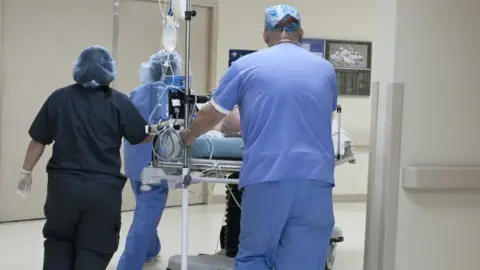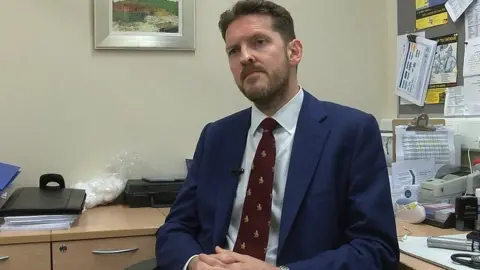Top doctor says 'no way' Scottish NHS can survive
 Getty Images
Getty ImagesThe NHS is "broken" in Scotland and will not be able to survive in its current form, the head of the union that represents the country's doctors has claimed.
Dr Iain Kennedy, the chairman of the BMA, said health staff were "exhausted, burnt-out and broken".
And he said calls for the Scottish government to take action had fallen on deaf ears.
The government acknowledged that the NHS is facing unprecedented pressures.
It said this was due to backlogs caused by the Covid pandemic, Brexit-related staff shortages and increases in winter viruses such as flu.
Dr Kennedy said his NHS colleagues had told him over the past fortnight that the "whole health and social care system in Scotland is broken" and called for a "national conversation" on the future of the service.
He told BBC Scotland: "There is no way that the NHS in Scotland can survive - in fact, many of my members are telling me that the NHS in Scotland has died already.
"Over the past two weeks I have received testimonies from nearly 200 doctors, and what they're telling me is that the whole health and social care system in Scotland is broken.
"They are telling me that NHS Scotland is failing their patients and failing the workforce, and they're suffering from moral injury from constantly having to apologise to their patients."
Dr Kennedy, who is a GP in Inverness, said an "abject failure of workforce planning" meant that the NHS was now "haemorrhaging" staff.
He added: "They've told us that they've had enough, and they've been trying to get action from the Scottish government but their requests are falling on deaf ears."
He said Scottish government plans to recruit another 800 GPs by 2027 were "well off" target and that the number of vacancies in the health service was the worst he had seen in his 30-year career as a doctor.

Junior doctors in Scotland are preparing for industrial action as part of their demand for higher pay, with Dr Kennedy saying their salaries had "eroded by 23.5% since 2008".
Unions representing nurses and midwives in Scotland have also rejected the government's latest proposed pay deal and are planning strikes, with dates to be announced next month.
It comes as the latest figures showed waiting times performance in Scotland's emergency departments has hit another record low.
Only 55% of people were seen and subsequently admitted, discharged or transferred within four hours in the week up to 18 December. The government target is 95% of people who attend A&E to be seen within that timeframe.
The previous low, recorded in the week up to 27 November, was 61.8%.
There was also an increase of almost 700 in the number of people waiting more than 12 hours in emergency departments, rising to 1,821 during that time period compared to 1,150 the week before.
The number of people waiting more than eight hours also increased by almost 1,500 - from 3,045 to 4,536 - while those waiting more than four hours increased from 9,758 to 11,887.
BBC Scotland revealed last month how NHS leaders in Scotland have discussed creating a "two-tier" health service by having the wealthy pay for treatment, and the possibility of curtailing some free prescriptions.
First Minister Nicola Sturgeon - who has faced calls from opposition parties to sack Health secretary Humza Yousaf over his handling of the NHS - said at the time that the founding principles of the NHS were "not up for debate".
Responding to Dr Kennedy's comments, the Scottish government said there were record numbers of NHS staff and more were being recruited as part of a £600m winter resilience plan.
A spokeswoman added: "The situation we find ourselves in is the result of pandemic backlogs, Brexit-related staff shortages and increases in winter viruses such as flu, which has seen recent a significant rise in the last few weeks - making this winter the most challenging the NHS has ever faced.
"We know the difficulties staff are facing and want to repeat our thanks to all those working across all health and social care services this winter to make sure people receive the care they need."
